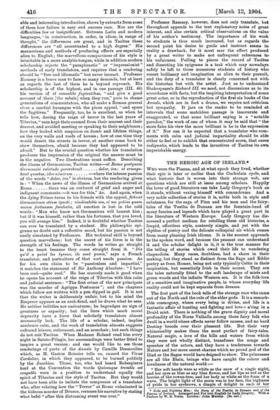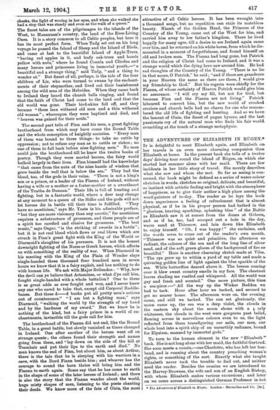WHO were the Fianna, and at what epoch they lived,
whether- their epic is later or earlier than the Cuchulain cycle, and what historic fact is woven into their strange web, are- questions which are still at issue among scholars. Happily
the lover of good literature can take Lady Gregory's book as it stands, without vexing himself with conundrums. And a very noble collection of stories it is, noble both in style and. substance, for the saga of Finn and his men and the fairy-
tales of the Tuatha de Danaan are the fountain-bead of many fancies and legends which have played a great part in the literature of Western Europe. Lady Gregory has die- covered a perfect medium for retelling these old histories, a limpid, effortless style, austerely simple, and yet with the rhythm of poetry and the delicate colloquial air which comes from many pleasing Irish idioms. It is the nearest approach to the spoken word, and because the peasant can understand it and the scholar delight in it, it is the true manner for the telling of stories which owed their life to wandering rhapsodists. Many races, doubtless, had a share in their making, but they stand as distinct from the Saga and Eddie poetry as from Homer, being not only typically Celtic in their inspiration, but essentially Irish in their accent. They are the tales naturally fitted to the soft landscape of mists and green woods and the infinite Western sea. It is the folk-lore of a sensitive and imaginative people, in whose everyday life reality could not be kept separate from dreams.
The first part of the book tells of the strange race who came out of the North and the rule of the elder gods. It is a remark- able cosmogony, where every being is divine, and life is a fantastic affair of hunting and fighting and love-n a'ling in a Druid mist. There is nothing of the grave dignity and moral profundity of the Norse Valhqlla among these fairy folk whe dwell in a world where effects never follow causes, and no hard Destiny broods over their pleasant life. But their very whimsicality makes them the most perfect of fairy-tales.
Natural magic, a love of the hills and waters from which they were not wholly distinct, transfuses the songs and speeches of the actors, and they have a tenderness towards Nature and her more secret charms which no proud god of the Iliad or the Sagas would have deigned to show. The princesses are all like Etain, beings who have caught the colour and. loveliness of the natural world :—
"Her soft hands were as white as the snow of a single night,. and her eyes as blue as any blue flower, and her lips as red as the berries of the rowan-tree, and her body as white as the foam of a wave. The bright light of the moon was in her face, the highness of pride in her eyebrows, a dimple of delight in each of her • Gods and Fighting Man the Story of the Taatha de Danaan and of the Fianna of Ireland. Arranged and Put into English by Lady Gregory. With a Preface by W. B. Yeats. London ; John Murray. [6s. net.]
cheeks, the light of wooing in her eyes, and when she walked she had a step that was steady and even as the walk of a queen."
The finest tales are of the pilgrimages to the islands of the West, to Manannan's country, the land of the Ever-Living Ones. It is a story common to all Celtic peoples, but here it has its most perfect form. When Tadg set out on his long voyage he passed the Island of Sheep and the Island of Birds, and came at last to the beautiful Island of Apple-Trees, "having red apples in it, and leafy oak-trees and hazels yellow with nuts," where he found Connla and Cliodna and many heroes and princesses living in immortal youth,—" a beautiful and a strange thing," said Tadg, "and a thing to wonder at." But finest of all, perhaps, is the tale of the four children of Lir, who were turned to swans by the enchant- ments of their stepmother, and lived out their banishment among the wild seas of the Hebrides. When they came back to Ireland they heard the church bells ringing, and found that the faith of Christ had come to the land and that the old world was gone. Their bird-skins fell off, and they became "three lean withered old men and a thin withered old woman" ; whereupon they were baptised and died, and "heaven was gained for their souls."
The second part tells of Finn and his men, a great fighting brotherhood from which may have come the Round Table and the whole conception of knightly societies. "Every man of them was bound to three things : to take no cattle by oppression ; not to refuse any man as to cattle or riches ; no one of them to fall back before nine fighting men." No man could join the brotherhood till he knew the twelve books of poetry. Though they were mortal heroes, the fairy world bulked largely in their lives. Finn himself had the knowledge "that came from the nuts of the nine hazels of wisdom that grew beside the well that is below the sea." They had the blood, too, of the gods in their veins. "There is not a king's son or a prince, or a leader of the Fianna of Ireland, without having a wife or a mother or a foster-mother or a sweetheart of the Tuatha de Danaan." Their life is full of hunting and fighting, but in a fantastic world, where a deer may change at any moment to a queen of the Sidhe and the gods will not let heroes die in battle till their time is fulfilled. "They have no asceticism," says Mr. Yeats in his admirable preface, "but they are more visionary than any ascetic," for asceticism requires a substructure of grossness, and these people are of a spirit too rarefied and elusive for grossness. "The best music," says Osgar, "is the striking of swords in a battle" ; but it is not real blood which flows or real blows which are struck in Finn's great fight with the King of the World or Diarmuid's slaughter of his pursuers. It is not the honest downright fighting of the Norse or Greek heroes, which affects us with something of the reality of war. When Diarmuid in his meeting with the King of the Plain of Wonder slays single-handed three thousand four hundred men in seven hours we know that it is a fairy exploit, and has nothing to do with human life. We ask with Major Bellenden : "Why, bow the devil can ye believe that Artamines, or what d'ye call him, fought single-handed with a whole battalion ? One to three is as great odds as ever fought and won, and I never knew any one who cared to take that, except old Corporal Raddle- banes. But these d—d books put all pretty men's actions out of countenance." "I am but a fighting man," says Diarmuid, "walking the world by the strength of my band and by the hardness of my sword." But we know he is nothing of the kind, but a fairy prince in a world of en- chantments, invincible till the gods call for him.
The brotherhood of the Fianna did not end, like the Round Table, in a great battle, but slowly vanished as times changed in Ireland. One after another of the heroes went off on strange quests ; the others found their strength and names going from them, and "lay down on the side of the hill at Teamhair and put their lips to the earth and died." No man knows the end of Finn, but about him, as about Arthur, there is the tale that he is sleeping with his warriors in a cave, with the Dord Fiann beside him ; and whoever has the courage to sound the horn thrice will bring him and the Fianna to earth again. Some say that he has come to earth in the shape of some of the later heroes of Ireland ; and there is also the story that the Fianna wander about the world, huge misty shapes of men, listening to the poets chanting their deeds. We know more of the fate of Oisin, the most attractive of all Celtic heroes. It has been wrought into a thousand songs, but no repetition can stale its matchless. beauty. Niamh of the Golden Head, the Princess of the- Country of the Young, came out of the West for him, and carried him away to her father's kingdom. There he lived happily for many ages, till a desire to see Ireland again came over him, and he returned on his white horse, from which he dis- mounted in a moment of forgetfulness, and found himself an old and broken man. The Fianna had long gone, but Patrick and the religion of Christ had come to Ireland, and it was a. strange world which the dying hero saw around him. He had sad thoughts of the Country of the Young. "There is no lie- in that name, 0 Patrick," be said ; "and if there are grandeur& in your Heaven the same as there are there, I would give my friendship to God." But his regrets were chiefly for the Fianna, of whose certainty of Heaven Patrick would give him, no assurance. "I will cry my fill, but not for God, but. because Finn and the Fianna are not living." Patrick laboured to convert him, but the new world of crooked croziers and church bells had no charm for one who remem- bered the old life of fighting and hunting. And so we have- the lament of Oisin, the finest of pagan hymns, and the last passionate cry of the natural man who finds his fair world. crumbling at the touch of a strange metaphysic.











































 Previous page
Previous page